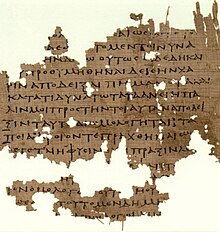
Back كذبة نبيلة Arabic Благородна лъжа Bulgarian Mentida noble Catalan Den ædle løgn Danish Nobla mensogo Esperanto Mentira piadosa Spanish Jalo valhe Finnish Mito della nobile menzogna Italian 高貴な嘘 Japanese 고귀한 거짓말 Korean
This article contains too many or overly lengthy quotations. (February 2024) |

In Plato's The Republic, a noble lie is a myth or a lie knowingly propagated by an elite to maintain social harmony.[1] Plato presented the noble lie (γενναῖον ψεῦδος, gennaion pseudos)[2] in the fictional tale known as the myth or parable of the metals in Book III. In it, Socrates provides the origin of the three social classes who compose the republic proposed by Plato. Socrates is taken to speak of a socially stratified society as a metaphor for the individual human soul,[citation needed] wherein the populace are told "a sort of Phoenician tale":
...the earth, as being their mother, delivered them, and now, as if their land were their mother and their nurse, they ought to take thought for her and defend her against any attack and regard the other citizens as their brothers and children of the self-same earth...While all of you, in the city, are brothers, we will say in our tale, yet god, in fashioning those of you who are fitted to hold rule, mingled gold in their generation, for which reason they are the most precious—but in the helpers, silver, and iron and brass in the farmers and other craftsmen. And, as you are all akin, though, for the most part, you will breed after your kinds, it may sometimes happen that a golden father would beget a silver son, and that a golden offspring would come from a silver sire, and that the rest would, in like manner, be born of one another. So that the first and chief injunction that the god lays upon the rulers is that of nothing else are they to be such careful guardians, and so intently observant as of the intermixture of these metals in the souls of their offspring, and if sons are born to them with an infusion of brass or iron they shall by no means give way to pity in their treatment of them, but shall assign to each the status due to his nature and thrust them out among the artisans or the farmers. And again, if from these there is born a son with unexpected gold or silver in his composition they shall honor such and bid them go up higher, some to the office of guardian, some to the assistanceship, alleging that there is an oracle that the city shall then be overthrown when the man of iron or brass is its guardian.[3]
Socrates proposes and claims that if the people believed "this myth...[it] would have a good effect, making them more inclined to care for the state and one another."[4] This is his noble lie: "a contrivance for one of those falsehoods that come into being in case of need, of which we were just now talking, some noble one..."[5]
- ^ Brown, Eric (2017), "Plato's Ethics and Politics in The Republic", in Zalta, Edward N. (ed.), The Stanford Encyclopedia of Philosophy (Fall 2017 ed.), Metaphysics Research Lab, Stanford University, retrieved 2019-11-26
- ^ Translator Allan Bloom explains, "The word is generation which is, primarily, 'noble' in the sense of 'nobly born' or 'well bred'..." and refers to Plato's Republic 375a and 409c for comparison (p. 455 n. 65, The Republic of Plato, 2nd edition, New York: Basic Books, 1991).
- ^ Book 3, 414e–15c
- ^ Book 3, 415c–d
- ^ 414b–c
© MMXXIII Rich X Search. We shall prevail. All rights reserved. Rich X Search